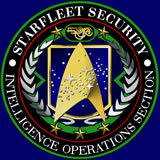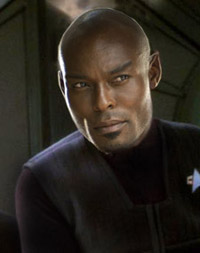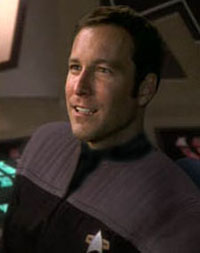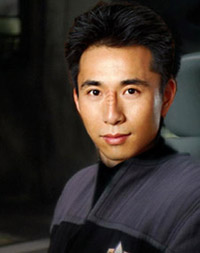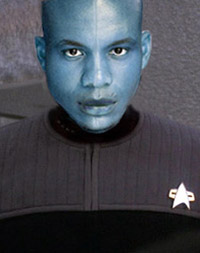| |
|
SFI is the information gathering section of the Starfleet and responsible for foreign and domestic espionage, counter-espionage, and the identification of external security threats. It is modeled on the classic intelligence agencies of Earth’s past (CIA, MI5, etc.)
The agency is divided into six different sections: clandestine services, liaison corps, analytical corps, tech ops, internal affairs, and temporal investigations. There are also subsections crossing over into other departments of Starfleet Command, most notably JAG, Communications and Security. It is headed by a Command Council of seven members: the Chief Director of Starfleet Intelligence and the directors from each division.
Formal ranks amongst the members of the SFI Command Council do not apply when thinking in terms of the command structure of the council. Rather, the pecking order is determined through the leadership direction the Chief Director decides to take and, consequently, the agency to which each sub-director belongs.
|
|
|
Chief Director,
Starfleet Intelligence
Admiral
Marty Batanides
Human
|
Marta "Marty" Batanides (early 70s) took the Director's position after the fall of her predecessor Pavel Illyanovitch, who was disabled and disgraced in wake of the revelations regarding the realities of Section 31 in late 2382. A career Intelligence agent, she was a passionate opponent of the rumoured organization, and in light of these revelations she has vowed to reinvigorate and reorganize SFI to better serve its purpose for the people of the Federation. She is well respected by everyone in Command and those underneath her. Marty is known for her determination, sharp wit, and no-nonsense approach.
|
|
|
Director,
Clandestine Operations
Colonel
K Jordan Elaithin
Human
|
Clandestine Ops is arguably, the most influential and powerful aspect of Intelligence. They are the people in the field gathering information and risking their lives. The command chain of the Clandestine Ops division is different from the others in order to ensure highest secrecy. There are no sub-divisions: everything is conducted through the Division's Director. There are about four hundred agents in Clandestine Ops, making up approximately 6% of the Intelligence community. Those four hundred are divided according to field rating, something decided through time served, rigorous training, and testing of various types: psychological, strength, agility and, for lack of better term, ability for deception. Agents are marked 1-9, with one being the highest. Only a half dozen agents are field rated 1, and they are usually assigned to deep immersion, undercover field missions, often for years. Most career Clandestine Operatives are in the 4-5 range. In order to become a Clandestine Operative, one must undergo strenuous training at Starfleet’s London campus, which will provide a basic field rating. Depending upon performance, the agent-applicant may be offered deep-immersion field training, usually comprising of a year post-Academy and conducted off-site.
Below the Director, the Clandestine Service is organized into two categories: handlers and agents. Handlers are rated field agents who have established themselves through years of service. They head agent teams on the field, coordinate missions, and ensure the safety of those involved. The Handlers communicate directly with the Division Director, and often work with the Analytical Corps as well; they might also be analysts who have had extensive field training. In this case, they are technically part of the analytical corps, though if there is a discrepancy they are expected to work within the CS command structure.
With the reformation of Starfleet Intelligence, several agents have been recalled from the field and placed on the most high-profile front lines vessels. They are ordered to work within the ship’s pre-existing command structure, though orders from the Director may override the Captain or ship’s Intelligence Liaison.
Director Kit Jordan Elaithin, the wife of the USS Miranda's famed Captain Elaithin Jii, is a controversial figure. This is, in a large part, due to the fact she was recruited and raised in Clandestine Ops by the now disgraced Ford Serpico-- once the Division Director, he was later identified to be the Head of Section 31. Although Jordan's role in bringing down the Section afforded her a "pardon", many people are still doubtful as to how innocent she really is. Regardless, Jordan is a solid Director who has worked extensively with Batanides to ensure a reorganization of the division. She keeps close tabs on all her agents, often runs her own missions, and is a successful and capable administrator. Despite the rumours and controversy she inspires, she is a valued member of the command staff.
|
|
|
Director,
Internal Affairs
Director,
Analytical Corps
Colonel L'Nar
Vulcan
|
The Analysts are vital to the success of the Intelligence programs. They are responsible for taking the information gathered by Clandestine Field Operatives, interpreting it, and coming up with recommendations to put the information to the best use. Their recommendations are then relayed through the system and distributed to ship-based officers on the front lines who are able to present the information to the commander of the ship's intelligence attachment and up through to the ship's COs. Analysts make up the 65% of the total Starfleet Intelligence population..
Analysts work in various subgroups including political reconnaissance for both foreign and domestic groups, counter-terrorism, translation, media analysis, etc. Most analysts are based at Intelligence Headquarters in San Francisco and London, on high-traffic starbases, and on important tactical stations. Each sub-group has a Secretary that is involved directly with the Command Council of SFI, along with the Director of the Corps.
Director L'Nar is a stereotypical Vulcan, though he has developed a vague "sense of humour" when working amongst his colleagues. He is older, approaching 160, and has been in the Fleet for almost a century; he was a member of the Vulcan Science Academy before that. He has served longer in his post than the tenures of the other directors combined, and he is often looked to as a model for action and inaction. People at Command revere and respect him, and unlike some Vulcans, he appears to appreciate the respect (though he does find it unnecessary). He is always all business, like any Vulcan would be expected to be. L'Nar keeps a close watch on his analysts, inspects a great deal of data himself, and advises them to always been passive and impartial -- though he recognizes the difficulty most non-Vulcans face in this. He is not, however, above politics; like the Chief Director, Batanides, he finds the crimes perpetrated by Section 31 to be heinous and to represent a stain on the organization. He does not think highly of Colonel Elaithin, the Clandestine Operations Director, because of her role in all of it and finds it highly improbable someone of her intelligence would be as deceived as she claims to have been. In the current discussions within the Federation, he is more apt to take a neutral positions, believing the Federation should act preemptively if and only if it is 100% certain there is a true threat to its security.
|
|
|
Director,
Internal Affairs
Colonel
Galen Hish
Betazoid
|
Internal Affairs often work with the JAG Corps or in conjuncture with Clandestine agents. I.A. is responsible for investigating higher-ranked officers within the context of sensitive situations: monitoring the actions of suspect captains in a starship setting, admirals or ambassadors planet-side, etc. Officers monitored by I.A. might be thought to be abusing their rank and privilege, working with potential enemies of the state, or responsible for intelligence leaks; they may also be suspected as enemy espionage agents. Depending on the situation and evidence already collected, Clandestine Operatives may be requisitioned for a coordinated and long-running infiltration. I.A. is also used to monitor Captains new to command through undercover agents (often younger or less experienced agents on loan through Clandestine Ops) in order for Starfleet to best establish a thorough competency report and command profile.
Director Hish would be hated if he wasn't, quite possibly, the nicest man in Starfleet. He is a soft spoken, affable man who began as an analyst specializing in the psychology of commanders and political leaders. How he jumped from there to being the director of Internal Affairs is difficult to imagine, but it happened nonetheless. Fleet officers often get uncomfortable when he's around, but he no longer is, himself, involved in investigations; instead, Hish decides to take a more administrative approach to his position, deciding which cases require investigation and how he should proceed. He relies on people in Starfleet Command itself as well as his colleagues in SFI to weigh in on these decisions. He reserves judgments, on cases as well as personally, and attempts to remain neutral politically (though privately, he will admit to being a rather vehement proponent of the "dove" ideology).
|
|
|
Director,
Liaison's Corps
Colonel
Nyrandu Mase
Bajoran
|
The Liaisons are the visible component, serving as a direct link between the rest of the Fleet and SFI. Liaisons are stationed at embassies, on ships, and often accompany diplomatic teams. Embassy liaisons are field rated 9, with higher security clearance; they are never intended to be in the field except in the most extraordinary of circumstances. Ship based liaisons are often a 7 or 8 depending upon the ship: their security clearance is high and they are able to react to situations in the field, but are never sent planet side unless absolutely necessary.
The hierarchy of the Liaison’s Office is fairly complex. Underneath the Director are Chief Liaisons for each Fleet; depending on the size of the Fleet and the types of ships under its command (more ships of the line increases the number of agents stationed within the Fleet), the Chief Liaison could have between 6 and 30 agents under him. Liaison agents are stationed on exploratory and conflict (front lines) ships. Ship-based liaison officers report directly to the Fleet’s Chief Liaison, who reports directly to the Director. They are under the ship’s command structure to a point -- orders from the ship’s Captain will be followed unless the orders from the Fleet's Chief Liaison are contradictory.
Nyrandu Mase is entrenched in the politics of not only the Intelligence Community, but the rest of Starfleet and the Federation as a whole. He is SFI's political animal, and he likes it that way. He is very personable and likable, perhaps more a diplomat than a "spook", though appearances, especially in the Intel world, are deceiving. He takes a more dovish approach, is distrustful of Clandestine Ops and wary of analysts, finding both to be shifty and untrustworthy. However, when it's crunch time he is keenly aware of his feelings and keeps the buried so as to best conduct business.
|
|
|
Director,
Technical Operations
Major
Tarden Naz
Bajoran
|
Tech Ops is in charge of the technological aspects of Intelligence Operations. They work to construct implements to suit each specific mission and situation. They are the stereotypical egg-head geek types, a combination between scientist, engineer, and magician. They keep SFI agents on the cusp of the latest technology, much of which is highly classified. They are also responsible for keeping abreast of technological developments across the quadrant, policing illegal technologies, and assuring the enforcement of treaties.
Director Tarden Naz (early 40s) grew up during the Occupation, and thus had to be resourceful and creative; it is a trait that served him well once he made it off Bajor and to the Academy. He tries to remain neutral when it comes to the politics raging within the modern organization, and although he is the Tech Ops Director, he can often still be found tinkering in his lab. He seems a little aloof and eccentric, but is keenly aware of everything around him.
|
|
|
Director,
Temporal Investigations
Major
Tholan
Bolian
|
This small organization within the intelligence community largely keeps to itself. Their official orders are to maintain the timeline and investigate any incidences of time travel by Federation citizens that may have an effect on the time line. How they do this and the extent to which they are able to monitor the time line is vague.
T.I. agents are known for their seriousness, lack of humour, and rather cold demeanour. Director Tholan is no different. It has been said that when he steps into a room, all humour withers and dies as though it has been sucked out by a vacuum. He is good at his job, and his job is his life; he avoids his colleagues, often to the point of neglecting Council meetings, and prefers instead to occupy himself wholly on ensuring the timeline. Like Hish, he takes a more administrative direction in his command, but in times of gross negligence he will go into the field himself. You do not want to see Tholan come into your debriefing.
|
|
|
| |
| |
information and graphics created by Kate M -- please do not use without permission |
|
